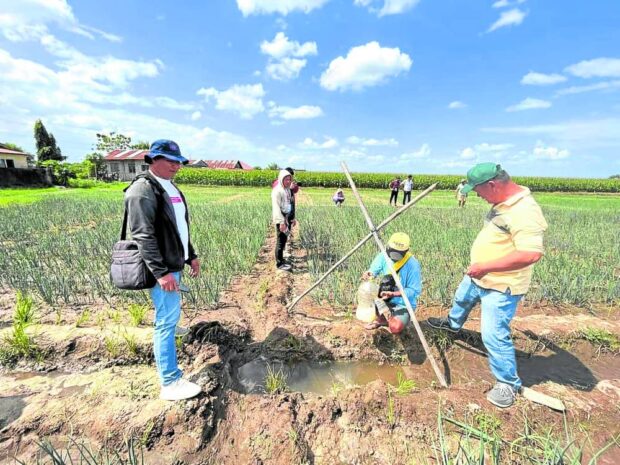Pampanga onion farmers reel from armyworm infestation

PREVENTION | Local agriculture officers and farmers install pheromone traps at an onion farm at Barangay San Ildefonso in Pampanga’s Magalang town in this photo taken on Tuesday, Jan. 30, 2023, to prevent the massive destruction of plant-munching armyworm. (Photo from the Central Luzon office of the Department of Agriculture)
MABALACAT CITY, Pampanga, Philippines — Onion farmer Nicolas Tayag, 57, had been hoping for a bountiful harvest but he had to resort to spraying their crops with pesticides regularly to get rid of the armyworms, locally known as “harabas,” that have been wreaking havoc on his 1.5-hectare farm at Barangay San Ildefonso, Magalang town in Pampanga province.
Having invested around P200,000 in planting onions, Tayag was now uncertain about securing profits come harvest time in the coming weeks.
“Some of my fellow farmers already harvested their onions, even if they were still small, instead of just letting the insects eat them. Otherwise, they will lose money,” he said in a local television interview on Jan. 27.
Central Luzon, which includes the provinces of Nueva Ecija and Pampanga, is the leading producer of onions, accounting for about half of the country’s production, Department of Agriculture (DA) records showed.
While Tayag and his fellow onion farmers were concerned about the impact of harabas on their crops, they were also worried about the influx of imported onions that affected the price of locally grown onions.
Article continues after this advertisementOn Monday, the DA’s Central Luzon office began providing technical briefings and distributing insect traps against armyworms to farmers in Magalang and nearby Bacolor town.
Article continues after this advertisementControl
In a statement on Tuesday, the DA Central Luzon said personnel of the Regional Crop Protection Center and Magalang’s agriculture office had already briefed onion farmers in San Ildefonso on how to control armyworms and save their crops from the infestation.
Pheromone lure, an effective insect trap against armyworms, was also distributed to farmers who were taught how to use it.
These traps use insect hormones to simulate female insects’ scents to lure their male counterparts.
Ildefonso Municipal Agriculturist Royce Lising said there was still no harabas outbreak in their town, noting that they had to undertake preventive and control measures against the destructive insects.
DA regional staff have also installed pheromone lures in Bacolor’s Sta. Ines and Concepcion villages with the help of the municipal and provincial agriculture offices.
Members of the Bacolor Onion Farmers Association were briefed and given traps against armyworms.
No data on the number of onion farmers or the scale of the onion farming industry in Pampanga was immediately available.
Larval stage
According to the DA, armyworms pose their greatest threat during the larval stage, capable of devastating 40 percent to 100 percent of a farm within a day or even hours of being left unchecked.
Onion armyworms could also infest rice, corn, cabbage, chili, watermelon, and several other vegetables and fruits, it said.
Armyworms could be controlled through pheromone traps, synchronous planting, field sanitation, an awareness campaign, plowing under plant residues after harvest to reduce pest populations, and the use of biopesticides, if needed
The DA said the first outbreak of armyworms in the country was recorded in the provinces of Nueva Ecija, Tarlac and Pangasinan in 2016, which could be the result of “mass long-distance migration” from countries located northeast of the Philippines due to the El Niño weather phenomenon, marked by a long dry spell, that year.
In the Cagayan Valley region, almost 4,000 hectares of corn plantations have been ravaged by widespread fall armyworm infestations since last month, leaving about P96 million worth of damage.
Minda Flor Aquino, chief of the DA-Regional Crop Protection Center, told the Inquirer in a recent interview that destructive plant-munching pests have affected corn farms in the provinces of Isabela, Cagayan, Quirino and Nueva Vizcaya since Dec. 1 last year.